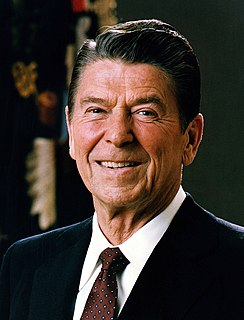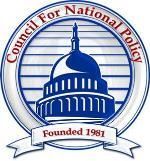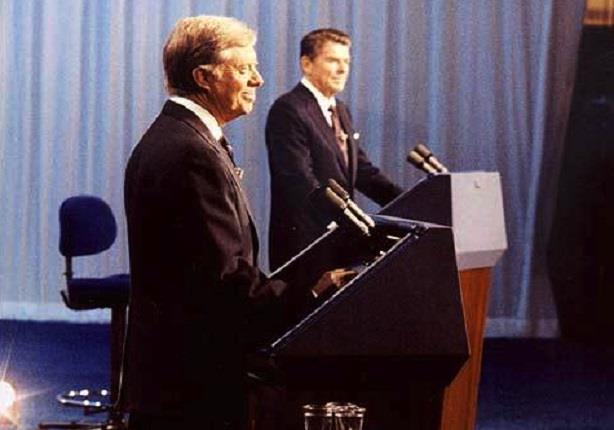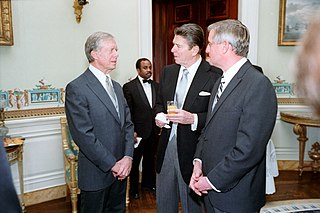Related Research Articles

Edwin Meese III is an American attorney, law professor, author and member of the Republican Party who served in official capacities within the Ronald Reagan's gubernatorial administration (1967–1974), the Reagan presidential transition team (1980–81) and the Reagan administration (1981–1985), eventually rising to hold the position of the 75th United States Attorney General (1985–1988), a position from which he resigned following the Wedtech scandal.
"Peace through strength" is a phrase that suggests that military power can help preserve peace. It is quite old and has famously been used by many leaders from Roman Emperor Hadrian in the second century AD to former US President Ronald Reagan in the 1980s. The concept has long been associated with realpolitik. The idea has critics, with Andrew Bacevich stating, "'Peace through strength' easily enough becomes 'peace through war.'"
The Heritage Foundation is an American conservative think tank based in Washington, D.C., primarily geared towards public policy. The foundation took a leading role in the conservative movement during the presidency of Ronald Reagan, whose policies were taken from Heritage's policy study Mandate for Leadership. Since then, The Heritage Foundation has continued to have a significant influence in U.S. public policy making, and is considered to be one of the most influential conservative public policy organizations in the United States.
"A City upon a Hill" is a phrase derived from the teaching of Salt and Light in Jesus's Sermon on the Mount. In a modern context, it is used in United States politics to refer to America acting as a "beacon of hope" for the world.

The Reagans is a 2003 American made-for-television biographical drama film about U.S. President Ronald Reagan and his family. The network CBS had planned to broadcast the film in November 2003 during fall "sweeps", but was ultimately broadcast on November 30 of that year on cable channel Showtime due to controversy over its portrayal of Reagan.
Compassionate conservatism is an American political philosophy that stresses using conservative techniques and concepts in order to improve the general welfare of society. The philosophy supports the implementation of policies designed to help the disadvantaged and alleviate poverty through the free market, envisaging a triangular relationship between government, charities and faith-based organizations. The term entered more mainstream parlance between 2001–2009, during the administration of US President George W. Bush. He used the term often to describe his personal views and embody some parts of his administration's agenda & policy approach.

The Ronald Reagan Presidential Library is the repository of presidential records from the administration of Ronald Reagan, the 40th president of the United States, and the burial place of the president and first lady, Nancy Reagan. It is the largest of the 13 federally operated presidential libraries, containing millions of documents, photographs, films and tapes. There is a permanent exhibit covering Ronald Reagan's life, as well as memorabilia such as Air Force One, the aircraft personally used by the president, and a section of masonry from the Berlin Wall. In 2007, thousands of artifacts were reported missing, and poor record-keeping as well as a breakdown in security software were blamed.

Ronald Reagan's tenure as the 40th president of the United States lasted from his first inauguration on January 20, 1981, until January 20, 1989. Reagan, a Republican from California, took office following a landslide victory over Democratic incumbent President Jimmy Carter in the 1980 presidential election. Four years later, in the 1984 election, he defeated Democrat Walter Mondale to win re-election in a larger landslide. Reagan was succeeded by his vice president, George H. W. Bush, who won the 1988 presidential election with Reagan's support. Reagan's 1980 election resulted from a dramatic conservative shift to the right in American politics, including a loss of confidence in liberal, New Deal, and Great Society programs and priorities that had dominated the national agenda since the 1930s.

The Council for National Policy (CNP) is an umbrella organization and networking group for conservative and Republican activists in the United States. It was launched in 1981 during the Reagan administration by Tim LaHaye and other right-wing conservative Christians, to "bring more focus and force to conservative advocacy". It has been described by The New York Times as "a little-known club of a few hundred of the most powerful conservatives in the country", who meet three times yearly behind closed doors at undisclosed locations for a confidential conference. The Nation has called it a secretive organization that "networks wealthy right-wing donors together with top conservative operatives to plan long-term movement strategy". The organization has been described as a "pluto-theocracy".

"Senator, you're no Jack Kennedy" was a remark made during the 1988 United States vice-presidential debate by Democratic vice-presidential candidate Senator Lloyd Bentsen to Republican vice-presidential candidate Senator Dan Quayle in response to Quayle's mentioning the name of John F. Kennedy, the 35th President of the United States. Since then, the words "You're no Jack Kennedy," or some variation on the remark, have become a part of the political lexicon as a way to deflate politicians or other individuals perceived as thinking too highly of themselves. Michael Dukakis and Bentsen later went on to lose the 1988 United States presidential election to George H. W. Bush and Quayle, who thus became Vice President of the United States.
Movement conservatism is an inside term describing conservatism in the United States and New Right. According to George H. Nash (2009) the movement comprises a coalition of five distinct impulses. From the mid-1930s to the 1960s, libertarians, traditionalists, and anti-communists made up this coalition, with the goal of fighting the liberals' New Deal. In the 1970s, two more impulses were added with the addition of neoconservatives and the religious right.

United States President Barack Obama, a member of the Democratic Party, was endorsed or supported by some members of the Republican Party and by some political figures holding conservative views in the 2008 election. Although the vast majority of Obama's support came from liberal constituencies, some conservatives identified in him shared priorities or other positive attributes. As in any election, voters can and sometimes do cross party lines to vote for the other party's nominee. Republican and conservative Obama supporters were often referred to as "Obama Republicans", "Obamacans" or "Obamacons".

"There you go again" was a phrase spoken during the second presidential debate of 1980 by Republican presidential candidate Ronald Reagan to his Democratic opponent, incumbent President Jimmy Carter. Reagan would use the line in a few debates over the years, always in a way intended to disarm his opponent.

The Reagan Era or Age of Reagan is a periodization of recent American history used by historians and political observers to emphasize that the conservative "Reagan Revolution" led by President Ronald Reagan in domestic and foreign policy had a lasting impact. It overlaps with what political scientists call the Sixth Party System. Definitions of the Reagan Era universally include the 1980s, while more extensive definitions may also include the late 1970s, the 1990s, the 2000s, the 2010s, and even the 2020s. In his 2008 book, The Age of Reagan: A History, 1974–2008, historian and journalist Sean Wilentz argues that Reagan dominated this stretch of American history in the same way that Franklin D. Roosevelt and his New Deal legacy dominated the four decades that preceded it.

Ronald Reagan was the Governor of California for two terms, the first beginning in 1967 and the second in 1971. He left office in 1975, declining to run for a third term. Robert Finch, Edwin Reinecke and John L. Harmer served as lieutenant governors over the course of his governorship.
Women in conservatism in the United States have advocated for social, political, economic, and cultural conservative policies since anti-suffragism. Leading conservative women such as Phyllis Schlafly have expressed that women should embrace their privileged essential nature. This thread of belief can be traced through the anti-suffrage movement, the Red Scare, and the Reagan Era, and is still present in the 21st century, especially in several conservative women's organizations such as Concerned Women for America and the Independent Women's Forum.

The speeches and debates of Ronald Reagan comprise the seminal oratory of the 40th President of the United States. Reagan began his career in Iowa as a radio broadcaster. In 1937, he moved to Los Angeles where he started acting, first in films and later television. After delivering a stirring speech in support of Barry Goldwater's presidential candidacy in 1964, he was persuaded to seek the California governorship, winning two years later and again in 1970. In 1980, as the Republican nominee for president of the United States, he defeated incumbent Jimmy Carter. He was reelected in a landslide in 1984, proclaiming that it was "Morning in America". Reagan left office in 1989.
Jaquelin Holliday "Jack" Hume (1905–1991) was an American businessman and conservative philanthropist. He co-founded Basic American Foods, the world's largest producer of dried onion and garlic, and later dried potatoes, for instant mashed potatoes and boxed potato casseroles. He was a major donor to President Ronald Reagan, and a patron of the arts.
Ronald Reagan announced his candidacy for President of the United States on November 20, 1975. Reagan won primaries in several states, but eventually lost the nomination to incumbent president Gerald Ford at the 1976 Republican National Convention.

The presidential transition of Ronald Reagan began when Ronald Reagan won the 1980 United States presidential election, becoming the president-elect, and ended when Reagan was inaugurated at noon EST on January 20, 1981.
References
- ↑ Currie, Duncan. What Does "Reagan Republican" Mean In '07? CBS News, 2007-05-25.
- ↑ Herdt, Timm. 10 favor rekindling Reagan spirit, Ventura County Star, 2007-05-04.
- ↑ Cohen, Patricia. Conservative Thinkers Think Again, New York Times, 2008-07-20
- ↑ An insider's guide to the upcoming week, Washington Post, 2008-03-09
- ↑ Hagelin, Rebecca. What Would Reagan Do?, TownHall.com, 2008-01-09
- ↑ Meese, Edwin. Reagan Would Not Repeat Amnesty Mistake, Human Events, 2006-12-13.
- ↑ O'Beirne, Kate. What Would Reagan Do?, National Review Online, 2006-06-02.
- ↑ Pethokoukis, James. Energy: What Would Reagan Do?, U.S. News & World Report, 2008-08-06.
- ↑ Mantyla, Kyle. What Would Reagan Do? People for the American Way, 2006-07-11
- ↑ Kessler, Jim. What would Reagan Do? Third Way, 2008-09-25

